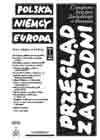Polska recepcja niemieckiej myśli pedagogicznej w pierwszej połowie XIX wieku
Polish Reception of German Pedagogical Thought in the First Half of the 19th Century
Author(s): Jan WnękSubject(s): Education
Published by: Instytut Zachodni im. Zygmunta Wojciechowskiego
Summary/Abstract: As a result of the fall of the Polish state in 1795 Poles were deprived of any influence on the official school system. School became a political instrument of the occupying country’s authorities. In this difficult period of national captivity, the pedagogical ideas of the most outstanding representatives of German pedagogical thought were propagated on Polish territory. Polish educators traveled in Germany to become acquainted with the activity of pedagogical institutes there and attempted to transfer their methods of work onto the Polish soil. An excellent way to popularize the ideas of German educators was translating their writings into Polish. In the first half of the 19th century the Polish public could read in their native Polish tongue the then most popular works of such German authors as Campe, Niemeyer and Kant. Some of the translations were published (and commented upon) in journals. Polish educators used the German pedagogical literature critically, adapting the views of German authors to the Polish conditions.
Journal: Przegląd Zachodni
- Issue Year: 346/2013
- Issue No: 02
- Page Range: 191-204
- Page Count: 14
- Language: Polish

